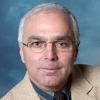
A view shows ice floating on a lake Oct. 16 in front of the Solheimajokull Glacier, where the ice has receded by more than 1 kilometer (0.6 miles) since annual measurements began in 1931. (CNS/Thibault Camus, pool via Reuters)
"A very solid scientific consensus indicates that we are presently witnessing a disturbing warming of the climatic system," warns Pope Francis.
In his famous environmental encyclical letter "Laudato Si' ,On Care for Our Common Home," the Holy Father further warns, "In recent decades this warming has been accompanied by a constant rise in the sea level and, it would appear, by an increase of extreme weather events. … Humanity is called to recognize the need for changes of lifestyle, production and consumption, in order to combat this warming. …"
High-ranking representatives of nearly all of the world's nations would be wise to take seriously these critical warnings from Pope Francis as they convene later this month to discuss -- and hopefully agree -- on how best to address the climate changing dangers facing the earth and its inhabitants.
From Nov. 30 to Dec. 11 the Conference of the Parties to the United Nations Framework Convention on Climate Change will meet in Paris to hopefully agree on how to drastically limit global warming.
The U.N. Intergovernmental Panel on Climate Change, National Oceanic and Atmospheric Administration, Federation of American Scientists, Union of Concerned Scientists and many other scientific organizations, all similarly agree with the National Aeronautics and Space Administration (NASA) that, "Climate-warming trends over the past century are very likely due to human activities."
Furthermore, NASA confirms that numerous studies published in peer-reviewed scientific journals reveal that 97 percent or more of actively publishing climate scientists agree that human activities are the main cause of dangerous climate change -- especially global warming.
Despite the overwhelming evidence, many people prefer to believe corporate fiction instead of scientific fact.
The Union of Concerned Scientists states, "No matter how much data we publish, if companies with enormous resources like ExxonMobil can dissuade people from accepting climate science, then the data won't matter."
Even the U.S. military acknowledges the dangers of climate change.
According to Forbes financial magazine, the Military Advisory Board of the Center for Naval Analysis in its report "National Security and the Accelerating Risks of Climate Change" warns that, "The potential security ramifications of global climate change should be serving as catalysts for cooperation and change. Instead, climate change impacts are already accelerating instability in vulnerable areas of the world and are serving as catalysts for conflict."
Lay Franciscan Lonnie Ellis, associate director of the Catholic Climate Covenant, explained to me that, "Many of those who suffer the most from climate change have contributed the least to it."
For example, he said, "In Sierra Leone where I have worked, the changing climate is causing flash floods and mudslides. But yet it takes the greenhouse gas emissions of 85 Sierra Leoneans to equal that of one American."
He said in Bangladesh the ratio is 44 to 1, in Chad it's 425 to 1, and in Lesotho it takes the emissions of approximately 1,900 people to equal just one American.
Pope Francis, in his environmental encyclical Laudato Si' writes, "We know that technology based on the use of highly polluting fossil fuels -- especially coal, but also oil and, to a lesser degree, gas -- needs to be progressively replaced without delay."
In union with Pope Francis, bishop-presidents of several episcopal bodies representing every continent on Earth, have written an appeal letter to representatives of the upcoming U.N. climate conference in Paris, urging them to commit to total decarbonization by 2050, to provide affordable renewable clean energy for all, and to adequately aid vulnerable nations suffering the effects of climate change.
In union with Pope Francis and the bishops, we can increase our commitment to protecting creation by signing the Catholic Climate Covenant's petition to Todd Stern, U.S. Special Envoy for Climate Change.
Many members of Congress who receive financial support from oil, coal and gas corporations will likely try to derail U.S. agreements reached with other climate conference nations -- as some in Congress attempted to do with the U.N. Security Council's nuclear weapons agreement with Iran.
Therefore, it is very important that you email and call (Capitol switchboard: 202-224-3121) your congressional delegation urging them to support, and not block, agreements reached at the upcoming U.N. climate conference in Paris.
In his June 5, 2013 General Audience Pope Francis said, "We are losing our attitude of wonder, of contemplation, of listening to creation and thus we no longer manage to interpret in it what Benedict XVI calls 'the rhythm of the love-story between God and man.' "
If we open our hearts, and allow ourselves to discover the God-given ability to wonder, contemplate and listen to creation, we will deeply experience the love-story between God and humanity.
[Tony Magliano is an internationally syndicated social justice and peace columnist. He is available to speak at diocesan or parish gatherings about Catholic social teaching. His keynote address, "Advancing the Kingdom of God in the 21st Century," has been well received by diocesan gatherings from San Clemente, Calif., to Baltimore. His email address is tmag@zoominternet.net.]
Editor's note: We can send you an email alert every time Tony Magliano's column, "Making a Difference," is posted. Go to this page and follow directions: Email alert sign-up.


